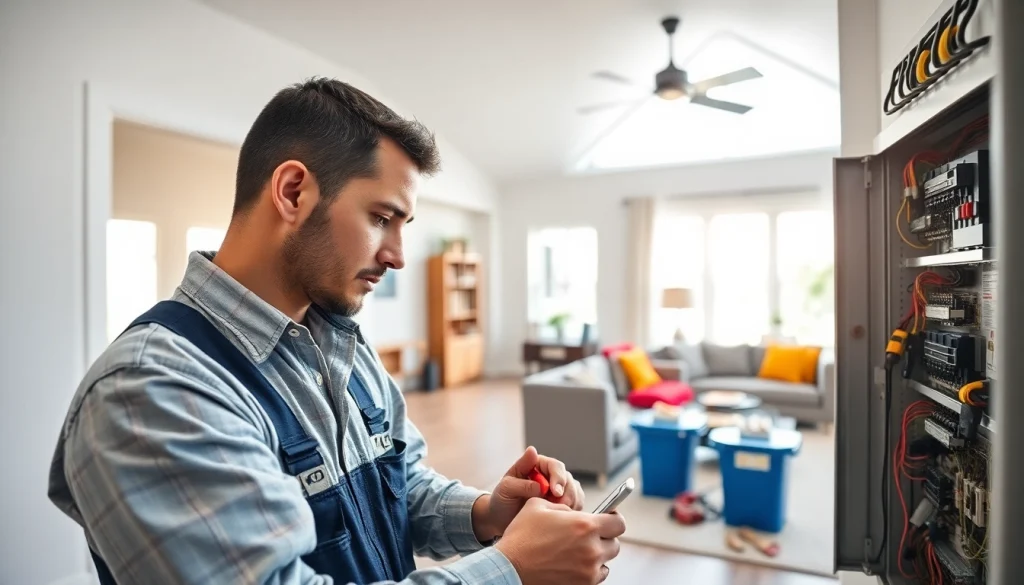Understanding Electrical Panel Clearwater Basics
What is an Electrical Panel?
An electrical panel is the critical hub for your home’s electrical system. Often referred to as a breaker box or service panel, this device acts as a central point for distributing electrical power throughout your home. The panel receives incoming electricity from the utility company and distributes it to various circuits within your home. Essentially, it manages and balances the electrical load, ensuring that sufficient power reaches outlets, fixtures, and appliances safely.
The structure of an electrical panel typically includes circuit breakers—fuse-like devices that can automatically shut off electrical flow in the case of a fault or overload. This is an essential feature that enhances safety, preventing potential electrical fires caused by overheating or overloading in specific circuits.
Why Upgrade Your Electrical Panel?
Upgrading your electrical panel is a vital consideration for many homeowners, especially those with older homes. Over time, as electrical demand increases—due to new appliances, modern technology, and overall increased usage—the existing electrical panel may not suffice. The risks associated with an outdated or inadequate electrical panel can lead to electrical hazards and safety concerns.
Additionally, local building codes can change over time. If your panel is outdated, it may not meet current safety standards, which could pose a legal issue if you are selling your house or face inspection requirements. Opting for an upgrade addresses these concerns and ensures that your system is future-proofed against upcoming technological requirements.
Key Components of an Electrical Panel
- Main Breaker: This is the primary switch that can shut off power to the entire panel. It allows for quick disconnection.
- Circuit Breakers: These smaller switches are responsible for individual circuits. They monitor electrical flow and shut off the circuit if an overload occurs.
- Bus Bars: Conductive bars that distribute electricity to the breakers. Different panels may have different configurations depending on their design.
- Main Neutral and Ground Bus: This setup connects the grounding wires and main neutral wire to help ensure electrical safety and reduce risk in case of faults.
Signs You Need to Upgrade Your Electrical Panel Clearwater
Increasing Power Demands and Outdated Equipment
The shift towards smart homes and reliance on high-demand appliances, like air conditioning units, electric cars, and multiple electronics, often leads to an increasing need for electricity. If you find yourself frequently flipping breakers or experiencing dimming lights when you run multiple devices, these are indicators that your panel may be underpowered.
Older homes, particularly those built before the 1980s, may feature panels with a capacity of just 60 amps or even lower. Modern home standards recommend a minimum of 100 amps, with larger homes often requiring 200 amps or more. If your home has such an outdated system, an upgrade is essential not only for convenience but also for safety.
Frequent Breaker Tripping Issues
Frequent tripping can be more than just an inconvenience; it often signals that your panel is overloaded. When circuit breakers trip consistently, they indicate that you’re drawing more electricity than the circuit can handle. This is a sign that it may be time to assess your panel’s capacity. Additionally, whether it’s due to faulty wiring, circuit designs that are not conducive to modern usage, or simply wear and tear, a thorough evaluation is essential.
Warning Signs of Electrical Hazards
Look for signs such as buzzing or cracking noises from the breaker panel, flickering lights, burning odors, or discolored outlets. Each of these indicators can be symptoms of underlying problems, such as loosened connections, malfunctioning breakers, or even damaged wiring. Ignoring these red flags can lead to dangerous situations, including electrical fires.
If you notice any of these warning signals, it is crucial to consult a qualified electrician, particularly one familiar with the specific requirements of Clearwater, and consider an upgrade of your electrical panel.
Benefits of Upgrading Your Electrical Panel Clearwater
Enhanced Safety Features
Safety should always be the first priority in any home. An upgraded electrical panel is equipped with the latest technology designed to meet current safety standards. Modern panels can include more circuit breakers, allowing for better control of electrical flow, and equipment that can detect ground faults and prevent overload—a significant improvement over older systems.
Moreover, upgrading to a new electrical panel eliminates the risks associated with outdated technology and enhances the safety of your family’s living environment. Ensuring that your electrical system can handle contemporary energy demands without the risk of overheating can prevent potentially tragic outcomes.
Improved Energy Efficiency
In conjunction with safety benefits, an upgraded electrical panel can lead to improved energy efficiency. Newer panels often provide better connections and lower resistance in electrical lines, producing less heat and waste. This leads to reduced energy costs and a smaller carbon footprint for your home.
Additionally, modern panels are capable of integrating with home automation systems, allowing you to optimize your energy usage. By scheduling or remotely managing which appliances are used and when, you can save both energy and money in the long run.
Increased Property Value
Investing in your home’s electrical infrastructure can positively contribute to its overall value. Potential home buyers often view a modern electrical panel as a strong selling point, reducing their concerns over future electrical safety or upgrading needs. When it comes time to sell your property, having an upgraded panel can make your home more appealing and competitive in the market.
When buyers see that significant upgrades have been made, such as a reliable electrical panel meeting current standards, they are more inclined to offer a better price. Thus, this upgrade not only enhances your daily living but can also be a strategic financial decision when it’s time to sell.
How to Choose the Right Electrical Panel Clearwater
Assessing Your Power Needs
Before upgrading, it’s essential to evaluate your energy requirements accurately. This assessment should consider both current and future needs based on lifestyle changes, home additions, or technological advancements. A simple way to start is by listing all the devices you use regularly, noting their amperage or wattage ratings.
A professional electrician can assist in this assessment, often utilizing energy audits to gauge your home’s capacity versus actual usage. This analysis allows you to choose a panel that suits your specific needs—not just a one-size-fits-all solution.
Understanding Different Panel Types
Electrical panels come in various types and sizes. Familiarizing yourself with the options available is crucial to making a strong choice for your household. You may encounter various components, such as main circuit panels, subpanels, and smart panels.
Main panels handle the primary load of your house, while subpanels can help manage additional loads or outlets in detached garages or other spaces. Smart panels, integrating digital features and connectivity capabilities, offer unprecedented control over your electrical usage. Understanding these distinctions is essential in choosing the right panel for your needs.
Consulting with a Professional Electrician
Ultimately, working with a licensed electrician is the best course of action when considering an upgrade. Professional advice takes the guesswork out of which panel to choose, ensuring that all regulations and codes are adhered to while aligning them with your specific requirements.
Electricians will also consider installation factors, such as potential electrical access spots or required rewiring, as upgrades can often involve more than just replacing the existing panel. Having a professional manage the logistics ensures that your upgrade is efficient and effective.
Steps to Upgrade Your Electrical Panel Clearwater
Preparing for the Upgrade Process
Preparation is key to a smooth upgrade. Begin by notifying your utility company about your intention to upgrade. They may need to disconnect power temporarily, and informing them ensures minimal disruption. During this stage, it’s also wise to develop a plan concerning what to expect about timelines and costs associated with the project.
If possible, clear the space around your electrical panel to facilitate the electrician’s work. Having a clear approach can speed up the process and ensure that the technician has safe access to work seamlessly.
What to Expect During the Installation
On the day of installation, expect the electricians to turn off the power at the main breaker. They will then remove the cover from the existing panel and detach it from its mounting. Upgrading may involve significant work if rewiring is necessary, so be prepared for noise and possible dust inflow during the process.
Once the new panel is mounted, the electrician will attach the wiring, install the circuit breakers, and eventually connect the new panel to the power supply. The entire process may take several hours, so having a plan for power access is crucial—especially if you rely on electricity for daily functionality.
Post-Installation Safety Checks and Maintenance
After installation, the electrician will conduct safety checks to ensure everything meets regulations and operates correctly. This includes verifying that all breakers are installed correctly, testing the functionality of the panel, and checking that the grounding is effective.
Post-installation maintenance is also essential. Regular inspections every few years can identify issues early, allowing for preventative measures to avoid potential problems. Additionally, ensure that your family knows how to operate the panel and what signs to look for that might indicate a problem.


